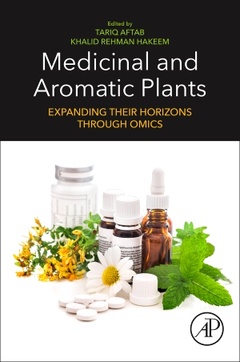Description
Medicinal and Aromatic Plants
Expanding their Horizons through Omics
Coordinators: Aftab Tariq, Hakeem Khalid Rehman
Language: English
Subject for Medicinal and Aromatic Plants:
Keywords
aging; Agrobacterium rhizogenes; antibacterial activity; anticancer; antimutagenic activity; antioxidant; apocarotenoids; aromatic plants; bioactive; bioactive constituents; biotechnology; breeding methods; broad-spectrum; chemotherapy; combinatorial metabolism; comprehensive analysis; CRISPR/Cas9; crocetin; crocin; Crocus sativus L; diabetes; elicitation; fingerprinting; flavonoids; fluxomics; functional genomics; fungal medicines; GC-MS; genetic engineering; genome editing; hairy root culture; herbal drugs; herbal medicine; longevity; medicinal and aromatic plants; medicinal and aromatic plants (MAPs); medicinal and nutraceutical plants; medicinal plants; metabolic engineering; metabolite profiling; metabolites; metabolomic studies; metabolomics; metabolomics database; model system; mycorrhiza; natural compounds; nutrients; omic approaches; plant cell culture; plasmids; proteomics; Rebaudioside A; saffron; Stevia rebaudiana; Steviol glycosides; symbiosis; terpenoid indole alkaloids; therapeutic; therapeutic plants; therapeutics; untargeted metabolites
464 p. · 15x22.8 cm · Paperback
Description
/li>Contents
/li>Readership
/li>Biography
/li>Comment
/li>
Growing consumer interest in organic and herbal-based products has led to great demand in the botanicals industry in the past few years. However, the growing number of products utilizing medicinal and aromatic plants (MAPs) has threatened an estimated 9,000 medicinal plant species worldwide, making it critical to reevaluate their research and development, production, and utilization. Continuing advances in Omics methodologies and instrumentation are essential to understanding how plants cope with the dynamic nature of their growing environment, how yields and characteristics can be improved, and how to most effectively direct conservation efforts.
With a focus on metabolomics, genomics, proteomics, transcriptomics, and more, Medicinal and Aromatic Plants: Expanding Their Horizons through Omics illustrates the genetic mechanisms of MAPs, providing a better understanding of MAPs conservation and methods to improve characteristics for medical applications. With an introduction on the role of MAPs in human health, subsequent chapters discuss using proteomics to increase MAP yields and plant quality, genome editing, and CRISPR/Cas9. A valuable resource for farmers, scientists, chemists, biochemists, pharmacists, and students interested in medicinal and aromatic plants and plant biology, Medicinal and Aromatic Plants: Expanding Their Horizons through Omics ensures readers have the background knowledge to put the necessary methodologies into practice themselves.
1. Review of the active principles of medicinal and aromatic plants and their disease fighting properties
2. Unraveling the mode of action of medicinal plants in delaying age related diseases using model organisms
3. Metabolomics and fluxomics studies in the medicinal plant Catharanthus roseus
4. Multivariate analysis of herbal drugs with diverse pharmacological activities: Metabolomics study
5. Metabolomics: A recent advanced omics technology in herbal medicine research
6. Genome Editing: Applications for Medicinal and Aromatic Plants
7. Cytogenetic and Bioactive Attributes of Crocus sativus (Saffron); a Tool to Unfold its Medicinal Mystery
8. Metabolic engineering for the production of plant therapeutic compounds
9. CRISPR/Cas9 mediated genome editing in medicinal and aromatic plants: Developments and applications
10. Proteomics research in aromatic plants and its contribution to the nutraceuticals and pharmaceutical outcomes
11. Fluxes of nutrients in mycorrhiza: What has fluxomics taught us in the plant-fungus interaction?
12. Metabolomics of Medicinal and Aromatic Plants: Goldmines of Secondary metabolites for Herbal Medicine Research
13. Exploration of biotechnological studies in low calorie sweetener Stevia rebaudiana: present and future prospects
14. Saffron (Crocus sativus L.): It’s Phytochemistry, Therapeutic Significance and Omics-based Biology
15. Exploitation of revered potent medicinal mushroom Ganoderma lucidum with particular accent on oncotherapeutics
Farmers, scientists and researchers interested in medicinal and aromatic plants (MAPs), students studying plant science, and chemists, biochemists, and pharmacists
Dr. Khalid Rehman Hakeem (PhD) is Professor at King Abdulaziz University, Jeddah, Saudi Arabia. He has more both teaching and research experience in plant eco-physiology, biotechnology and molecular biology, medicinal plant research, plant-microbe-soil interactions as well as in environmental studies. He has served as the visiting scientist at Jinan University, Guangzhou, China. He has more than 110 research publications in peer-reviewed international journals has extensive book publishing experience as well. He is included in the advisory board of Cambridge Scholars Publishing, UK. He is a fellow of Plantae group of the American Society of Plant Biologists, member of the World Academy of Sciences, member of the International Society for Development and Sustainability, Japan, and member of Asian Federation of Biotechnology, Korea.
- Includes in-depth analysis of Omics technologies for the enhancement of MAPs
- Discusses applications of MAPs including their role in human healthWritten by world-wide leading experts in the field
These books may interest you

OMICS Applications in Crop Science 293.12 €



